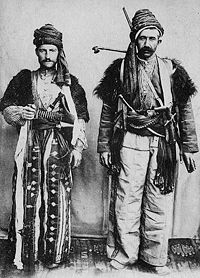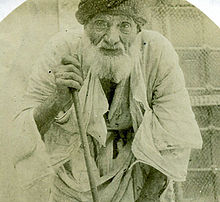- Chaldean Christians
-
Chaldean Christians
(ܟܲܠܕܵܝܹܐ Kaldāye)
Chaldean Catholics from Mardin, 19th century.Regions with significant populations  Iraq
Iraq550,000  Syria
Syria40,000  Iran
Iran20,000  Turkey
Turkey8,000 Religions Syriac Christianity (in union with Rome) Scriptures The Bible Languages Syriac as a liturgical language.[1]
(Neo-Aramaic, Arabic)Chaldean Christians
 /kælˈdiːən/ (ܟܠܕܝ̈ܐ) are ethnic Assyrian adherents of the Chaldean Catholic Church, most of whom entered communion with the Catholic Church from the Church of the East, which was already Catholic, but most wanted to stray away from the Catholic Church, causing the split in the 17th and 18th centuries.[2] In addition to their homeland, migrant Chaldean Catholic communities are found in the United States, Sweden, Germany, France, Canada and Australia.[3]
/kælˈdiːən/ (ܟܠܕܝ̈ܐ) are ethnic Assyrian adherents of the Chaldean Catholic Church, most of whom entered communion with the Catholic Church from the Church of the East, which was already Catholic, but most wanted to stray away from the Catholic Church, causing the split in the 17th and 18th centuries.[2] In addition to their homeland, migrant Chaldean Catholic communities are found in the United States, Sweden, Germany, France, Canada and Australia.[3]Geographically, the Chaldeans originate from central and southern Assyria, the Nineveh plains[4], where the ruins of the ancient Assyrian capitals of Nineveh and Nimrud are located.[5]
Chaldean Christians should not be confused with the Saint Thomas Christians of India (also called the Chaldean Syrian Church), who are also sometimes known as "Chaldean Christians".
Contents
Chaldean Catholics in Jordan and Turkey
The 1896 Statistics of the Chaldean Catholics[6] counted 233 parishes and 177 churches or chapels. The Chaldean Catholic clergy numbered 248 priests; they were assisted by the religious of the Congregation of St. Hormizd (Rabban-Hormizd) who numbered about one hundred. There were about 52 Chaldean schools (not counting those conducted by Latin nuns and missionaries). At Mosul there was a patriarchal seminary, distinct from the Chaldean seminary directed by the Dominicans. The total number of the Chaldean Christians is nearly 1.4 million, 78,000 of whom are in the Diocese of Mosul.
The patriarch considers Baghdad as the principal city of his see. His title of "Patriarch of Babylon" results from the identification of Baghdad with ancient Babylon (Baghdad is 55 miles north of the ancient city of Babylon and corresponds to northern Babylonia). However, the Chaldean patriarch resides habitually at Mosul and reserves for himself the direct administration of this diocese and that of Baghdad. There are five archbishops (resident respectively at Basra, Diyarbakır, Kirkuk, Salmas and Urmia) and seven bishops. Eight patriarchal vicars govern the small Chaldean communities dispersed throughout Turkey and Persia. The Chaldean clergy, especially the monks of Rabban-Hormizd, have established some missionary stations in the mountain districts inhabited by Nestorians. Three dioceses are in Persia, the others in Turkey.
The liturgical language of the Chaldean Catholic Church is Syriac a Neo-Aramaic dialect. The liturgy of the Chaldean Church is written in Syriac alphabet.
The literary revival in the early 20th century was mostly due to the Lazarist, Pere Bedjan, a Persian Chaldean Catholic, who devoted much industry and learning to popularizing among his people, including Catholics, Orthodox Christians and the Assyrian Church, their ancient chronicles, the lives of Assyrian saints and martyrs, even works of the ancient Assyrian doctors.[7]
In mid-March 2008, Chaldean Catholic Archbishop Paulos Faraj Rahho of Mosul was found dead, having been kidnapped two weeks earlier. Pope Benedict XVI condemned his death, calling it an act of inhuman violence. Sunni and Shia Muslims also expressed their condemnation.[8]
Chaldean Catholics today number approximately 550,000 of Iraq's estimated 800,000 Assyrian Christians.[2] Perhaps the best known Iraqi Chaldean Catholic is former Iraqi deputy prime minister, Tariq Aziz (real name Michael Youhanna).[2]
Predominantly Assyrian Chaldean Catholic towns in Iraq
- Alqosh (ܐܠܩܘܫ)
- Ankawa (ܥܢܟܒ݂ܐ)
- Araden (ܐܪܕܢ)
- Baqofah (ܒܝܬ ܩܘܦ̮ܐ)
- Batnaya (ܒܛܢܝܐ)
- Karamles (ܟܪܡܠܫ)
- Shaqlawa(ܫܩܠܒ݂ܐ)
- Tel Isqof (ܬܠܐ ܙܩܝܦ̮ܐ)
- Tel Keppe (ܬܠ ܟܦܐ)
See also
- Assyrian people
- The Last Assyrians
- East Syrian Rite
- Emmanuel III Delly
- List of Assyrian settlements
References
- ^ http://www.cnewa.us/default.aspx?ID=59&pagetypeID=9&sitecode=US&pageno=1
- ^ a b c BBC NEWS (March 13, 2008). "Who are the Chaldean Christians?". BBC NEWS. http://news.bbc.co.uk/2/hi/middle_east/7271828.stm. Retrieved March 26, 2010.
- ^ Edmund Ghareeb, Beth Dougherty (2004). Historical Dictionary of Iraq. Scarecrow Press. p. 56. ISBN 9780810843301. http://books.google.co.uk/books?id=uIyjeUAR5zYC.
- ^ http://www.adnkronos.com/AKI/English/Religion/?id=3.1.1271835942
- ^ "ASSYRIAN IDENTITY IN ANCIENT TIMES AND TODAY". http://www.aina.org/articles/assyrianidentity.pdf. "...many modern Assyrians originating from central Assyria now identify with "Chaldeans"..."
- ^ by Mgr. George 'Abdisho' Khayyath to the Abbé Chabot (Revue de l'Orient Chrétien, I, no. 4)
- ^ "New Advent Catholic Encyclopedia". http://www.newadvent.org/cathen/03559a.htm.
- ^ "Iraqi archbishop death condemned". BBC News. 2008-03-13. http://news.bbc.co.uk/2/hi/middle_east/7295672.stm. Retrieved 2009-12-31. from BBC News
 This article incorporates text from a publication now in the public domain: Herbermann, Charles, ed (1913). Catholic Encyclopedia. Robert Appleton Company.
This article incorporates text from a publication now in the public domain: Herbermann, Charles, ed (1913). Catholic Encyclopedia. Robert Appleton Company.External links
- Iraq: Chaldean Christians . UNHCR
- Chaldean Christians, Catholic Encyclopedia
- [1], BBC
Syriac Christianity Churches (West Syrian) Churches (East Syrian) Historically: Church of the East - Related: Nestorianism
Presently: Ancient Church of the East · Assyrian Church of the East · Chaldean Catholic ChurchChurches (in India) Historically: Malankara Church
Presently:
Eastern Oriental: Chaldean Syrian Church (Assyrian Church of the East in India)
Orthodox: Jacobite Syrian Christian Church · Malankara Orthodox Syrian Church (Indian Orthodox Church)
Catholic: Syro-Malabar Catholic Church · Syro-Malankara Catholic Church
Reform: Malabar Independent Syrian Church · Malankara Mar Thoma Syrian Church · St. Thomas Evangelical ChurchLanguages Assyrian Neo-Aramaic · Bohtan Neo-Aramaic · Chaldean Neo-Aramaic · Garshuni · Hértevin · Koy Sanjaq Surat · Syriac · Mlahsô · Senaya · TuroyoNational identity Categories:- Chaldean Catholic Church
- Assyrian people
- Ethnoreligious groups
- Iraqi people
- Ancient peoples
Wikimedia Foundation. 2010.


